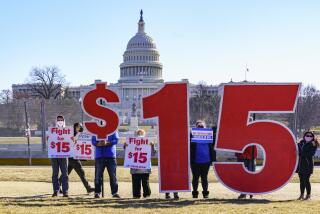Do your patriotic duty: Ask for a raise
The downturn we call the Great Recession officially started in 2007. But after spending the last two years talking to people who lost jobs, homes or savings during the official recession, Iâd argue that the trouble actually started decades earlier.
Almost all those I spoke to had already slogged through many years of stagnant or declining hourly wages by the time the recession kicked in. Couples who wanted to maintain homes like the ones they were raised in had often borrowed heavily and/or taken second and sometimes third jobs.
This suggests two things that I hope will enter into our economic decisions going forward: First, that declining wages were a significant cause of the Great Recession; and second, that raising wages now could help stave off the next downturn and keep America strong.
Between 1971 and 2007, U.S. hourly wages, adjusted for inflation, rose by 4%. (Thatâs not 4% a year; itâs 4% over 36 years!) During those same decades, productivity increased by 99% â that is, it nearly doubled. In other words, the average workerâs productivity rose 25 times more than his pay. But we Americans sell more than 70% of what we produce to one another. If the majority was earning less and producing more, who was going to buy all the stuff?
The investors who profited from the high productivity and low wages found themselves with a lot of money piling up in brokerage and bank accounts. Meanwhile, working people, also known as consumers, didnât earn quite enough to maintain their lifestyles. So the 99% had a great need to borrow at a time when the 1% had excess money to lend.
For two seconds, that may seem like perfect synergy. But think about it for six seconds. If I donât have $10 this year, and my wages arenât going up, how will I have $15 next year to pay you back with interest? Take out more loans?
Financiers arenât particularly stupider (or smarter) than the rest of us. But those piles of profit kept growing, and a bank canât simply keep its money in the bank. So they extended ever-larger loans to people with ever-smaller incomes. They loaned us money for big-ticket items like cars and college educations, then, through credit cards, for daily expenses.
The ultimate debt scheme of the era involved making mortgage loans to Americans who couldnât afford houses, then bundling those high-risk loans and selling them off to investors and financial institutions. No one should have been surprised when the whole shoddy structure eventually crashed.
But OK, the crash has already happened. In the rubble of a financial collapse, income gaps tend to narrow by themselves. Why do we need to adopt special wage-raising policies now?
During your normal recession, companies try to maintain their offices or plants and retain core workers while they wait for business to pick up. In the meantime, they compete on price and take less profit. As a result, the share of national income that goes to investors usually declines during recessions while the share that goes to employees increases.
Iâm not trying to tell you that workers got rich during previous recessions or that the rich become penniless. But their shares of the total income took a temporary Robin Hood turn.
This time has been different. Corporate profits were 25% to 30% higher at the official end of the Great Recession than they were before it started. Meanwhile, wages as a share of national income fell to 58%. Thatâs the lowest the wage share had been since it began to be recorded after World War II.
The Financial Times (my source for these statistics) calculated that âif wages were at their postwar average share of 63%, U.S. workers would earn an extra $740 [billion] this year [2012] or about $5,000 per worker.â Thatâs a lot of consuming power.
But none of that money has reverted to wages this time. All of it and more is crammed into those already distended sacks of capital, where itâs once again exerting unbearable pressure to be loaned. But that course would only hasten the next debt bubble. For our countryâs good, that money canât just be reloaned to us again; this time it must be redistributed. The cleanest way to do that is through wages.
We should start with a generous increase of the minimum wage. Patriotic employers will come forth on their own, Iâm sure, to offer the rest of us big raises once they realize itâs for the common good. In the few cases where they donât volunteer, you may have to ask, perhaps through unions.
Believe me, Iâm not suggesting this to be fair or kind or anything like that. Raising wages is the most efficient way to stabilize the U.S. economy. So go for that raise; itâs your patriotic duty.
Barbara Garson has written, among other things, the comedic play âMacBirdâ and the nonfiction book âDown the Up Escalator: How the 99% Live in the Great Recession.â
More to Read
A cure for the common opinion
Get thought-provoking perspectives with our weekly newsletter.
You may occasionally receive promotional content from the Los Angeles Times.










